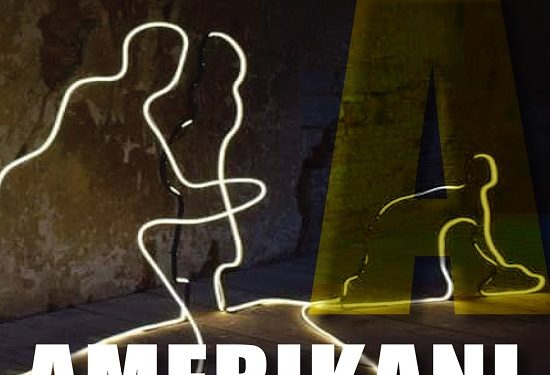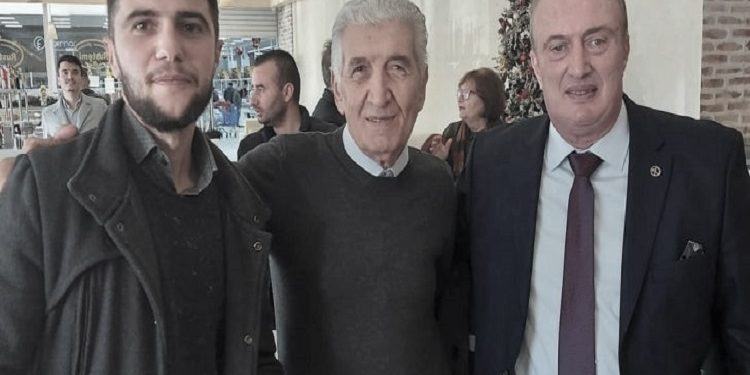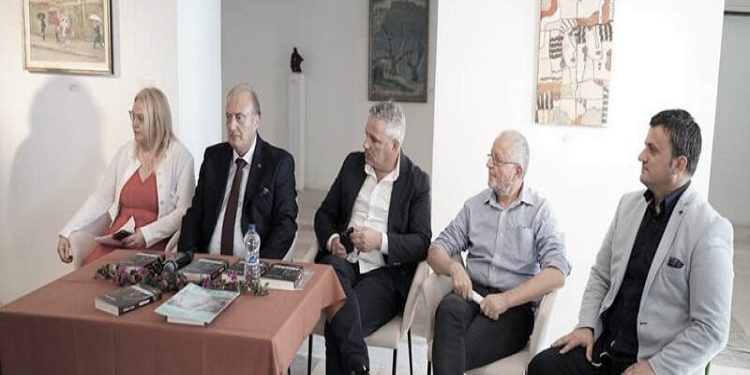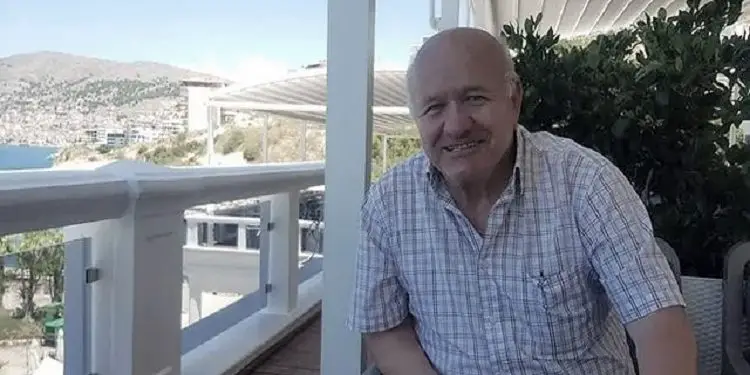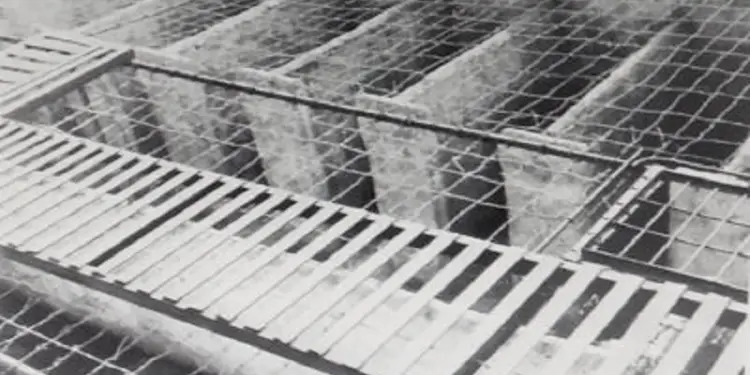By Timo Merkuri
Second part
Memorie.al / Through the “TOENA” Publishing House, Odise Kote brought the novel “Americani”, a work that shocks you like no other, in terms of content, as much as it amazes you for the art with which it was written. It is a very special novel, which comes for the first time in Albanian literature, with a subject like a soul pain, written in a poetic style with “grey color”, in which it grieves like rain, the blackness of suffering, like the white dew of hope and like a misty tis, the pink of the heart. With this novel, Odise Kote proved his maturity as a dignified writer of contemporary Albanian literature.
Continues from last issue
To cope with the psychological pressure, Nelson Andrea “escapes” through his memories of American life and love, where he relives the happiness “abandoned” by him, to keep a promise or bequest of his father. These memories give “air” to his breathing, but here’s the thing: “you don’t live just by breathing, you have to feel the aroma of life at every moment”, (Samuel Lion). These memories give him strength to resist and feed him the hope that one day, “he will escape from this hell”. These memories, where hope “grew”, were like some distant “islands” in the middle of the ocean of “fear”.
That’s where Nelson Andrea went down and lived his life. There, he made comparisons between the two lives and tried to find a piece of American life in Albania, mainly with his workmates: Oto, Neri and Sadiku and then Lola and Margarita, but he learned that, and there he was subdued, he is even horrified when they ask him to denounce his friends. Under these conditions, trapped, he silently accepts Rako Siran’s “orders” for a series of decisions on his life and personality. He agrees to “name himself”, his nephew, to change his name, to Nelo Andrea, from Nelson Andrea, he agrees to marry a deaf-mute girl, an innocent victim of fate and the state, he agrees to give up his profession and he is employed in the nursery team and after the second imprisonment, in the cemetery, he accepts and remains silent about everything that Rako Sirani tells him. He apparently turns into a mechanism that moves and lives only under Rako Siran’s conceit. Except this “conceived life” was for the eyes of Rako Sirani and those who saw him as “imperialist”, while for himself, Pandora and the children, in the evenings he closed himself in the dome and descended the “musical heaven on earth” with the violin Stradivari, that violin that he protected from the state, like the flag that the loyal soldier protects in war.
V – We must admit that Odise Kote, in the narration and comparison of events, thoughts and memories, proves a high creative skill, for the way of reflecting and opposing them, so alive. This is because he sees and writes literature as a continuous part of the human soul and not as a product of the mind. What’s more, in the journey of the subject of the book, he marks the dates of the events, as time points, as a chronicle that specifies the events:
“Unforgettable day, May 23, 1967. The Vienna-Tirana plane lands on the runway at around 11:18 p.m.”, “In November, six months after the arrest., he developed a severe fever with a high temperature”, “When it was fifteen months since the imprisonment, … It was July. July 9, 1968”, “Time 2.30 minutes. Cold night, with rain and wind”, “It was February, February 14, Saint Valentine”, “7:45 p.m. when Nelo Andrea entered the dome”, “In the spring, on May 27, 1980, at midnight…Nelo Andrea was arrested “, “The time was the same as the first time, 3.40 minutes. Sensation, 10 minutes later than the first time”, etc., giving even in book form, a structural accuracy and time correctness.
Odise Kote, is a beautiful writer of literature, who lives with literature and for literature. This is felt first, in the love with which he writes, the love with which he shows what he writes as dreamlike experiences. This is seen in the artistic beauty of the construction of the sentence, which resembles a stretched rainbow and that nerve, oh, that nerve that runs through the words of the lectures, makes you tremble, like before the first love. Read the novel and experience this feeling yourself.
Odise Kote, in fact, loves literature and this is evident in the sweetness and soulfulness of the lectures, almost as if spoken in a whisper, you say, his voice and heart tremble with emotion as in front of the girl he dreams of, when he speaks as ” author”, without tonality. This is because he has actually presented his spiritual world, his soul in moments of explosion of the “lava of inspiration”, which comes from the explosion of the “silent volcano”. You say that he runs and jumps behind this lava, the slide of which, he knows the direction: necessarily through the alleys of Gjirokastra.
I tell you that, as a designer, Odise Kote is special in Albanian literature, and not only that, he greatly enriches the literary vocabulary with words and phrases, which, although they have a “gray” color, like the stones of the castles of grayed by the antiquity of time, surprisingly in his lectures and verses, they “open” colorful petals, springing the gray environment and the meaningfulness of the phrase.
Phrases and words: “Great beams of light”, “boredom”, “a blade of light”, “tea”. “Hollak”, “had sprouted from the shadows”, “I will send my soul to hell and roast my heart there in the silence of oblivion”, “Talk to the dead, so that you can understand the living”, “Silence blew and thundered”, “wild “, “beyond whispers”, “Man cannot run away from his fate”, “Tears are the silent language of pain”, “Language”, “the stormy sky”, “Strambaluk sokakets”, “Rokopuja and the mess”, ” popëla”, “to vien anicire”, etc.,… cited as an illustration, speak of a knowledge and love of the author for the vocabulary and communal expressions of his city, and his artistic height in the successful use of them, in a contemporary novel.
Even on the basis of this experience, Odise Kote creates phrases that have the form and strength of proverbial expressions, beaten in the anvil of time, that descend in the text like lightning in the clear and surprise you, with their light and flash, such as: “Zogu do not build their nests in a cage, lest their young inherit captivity”, “Shame does not heal you. It doesn’t even help you to wash away your sins”, “The watchman was silent, I burned inside like a sunset”, “the betrayal that was held fast, with a thousand nails, not to be disturbed”, “The calmness that came from acceptance. From the dimension of acceptance of everything that the other brought with him, of the other’s culture”, “Darkness cannot drive out darkness, only light can do something like that. Not even hate can drive out hate, only truth and love accomplish this mission”, “Blaming a snake, because it has poisonous teeth, is not wisdom”, etc.
It is said that to appreciate an author, one must look at the opening phrase of the novel, the color and sound of the words. In this respect, the beginning of Odise Kote’s novel has a gray color and a heavy sound, with several lyrical sequences, mainly in his memories: “He had no way of understanding where that bout of boredom came from. His mouth was filled with the taste of bitterness. The sounds of the second movement of Beethoven’s violin concerto were ringing loudly in his head.” This gray of his style, while it is the dominant color of the novel, passes like a last cloud of winter that is leaving, in the spring sky that is opening in the very last passage of the novel: “The beautiful Pandorka, the woman who had given him everything Albanian Nelo Andreas, every particle and crumb of her body and life, was finally gone. Maybe he understood that in the new era, he could not give anything to the American Nelson. Maybe for this reason, he had left, as she knew: quietly, simply, without complications, without goodbye”, giving way to a new season in the character’s life.
Did I tell you that Odise Kote is from Gjirokastra, that he loves Gjirokastra and has taken from it, even reading his creations, to create the belief that he was created by the wind of the Wide Mountain and the aroma of manxurana and vasilikoi, from gurgullima of the Drino and the laughter of the girls in the alleys, from the muttering of the old women at weddings and their oil in the chapels, the clatter of boyish steps in the Bazaar Neck and the shadow of the castle like a party overhead, which gives way to the light of the sun, in the eyes Theirs. It seems to me, or, Odise Kote is dual, citizen and intellectual, who keeps the life, etymology and psychology of the city of yesterday crouched in a pocket of his heart and memory. It looks like an archive, but in fact he is a knowledgeable and talented Gyrocaster.
Many times, one of his words is enough to give a portrait of a person or a time. The Turkish word “saken”, which the author “explains” artistically as: “a Turkish word with mystery and strange power. It freezes, steppes as you hear it… it is widely used. Word – code, key. It is like a prism where all the prayers, requests, desires, whims, vices, mercies fall and all break their heads on the sharp, jagged ribs, unforgiving blades”, and to which I would add: “word that shows an order to stop instead of desires, initiatives, dreams and every new thought”, but which proves the fact that the Albanian society was stopped in the “Turkish Middle Ages” and the psychology of the state was a medieval psychology. This word typifies the character himself, who uses it so often, Rako Siran, that you can normally call him simply: “Shoku saka” and with this word, you have given his portrait with the right colors. It is a word, but the geography of its meaning requires a whole dictionary to show it.
The language of community speech, as much as it has the beauty, philosophy and sound of typical words, it also has the danger of a uniform vocabulary, used from one book to another, from prose to poetry. The mastery of the author is precisely the avoidance of creating a uniform expression, throughout his creativity. Let’s understand that: the flowers that bloom in a lawn are all typical lawn flowers, but they are not monochromatic flowers, nor parcelized, according to colors. Even less, they are the same in all lawns. Just as the chickadees choose the flowers that they crown, to carry on their heads in their toys, through these lawns, or the flowers that they gather in their hand bundles and take home with them, so the author chooses the words and phrases typical community, for his lectures and verses, appearing always as original as “colorful”.
VI – With a core density where the life of a future tree is crouched, Odise Kote, describes the events of the life of the stone city, reviving the docks, customs and culture, humor and humanity of the simple inhabitants: “Meeting at Brigadier Bariu:
– Friends… we are not alone. We have the People’s Republic of China on our side. China is with us. – What does China have for us? – Dikja did not hold back – as much wheat as rats eat in the barn of a ship, Albania wants as much wheat. We survived! Besides what Brigadier Bariu said, I heard that China will also bring us pieces of dok, dok more dok, dok. Dock for pants. Do you know how big China is? -“I mean – Oto broke his dedication – now we have Valarena and China as allies”… Well, to equate Valarena, a small village in Gjirokastër, with China as “allies” of Albania, only the deaf do not hear the irony.
“The destruction (of the churches) was preceded by extended gatherings of women and girls. They hotly debated the wickedness of backward customs and the reactionary poison of religious beliefs. The ruckus and chaos did not stop. As if this fall was not enough, some medieval churches were immediately transformed into Cultural Centers. Dance and joy. Some others became granaries of corn and beans”, reflecting the “youth initiative”, for the demolition of churches and mosques.
With a music: “…of discordant sounds, those sounds that fell as if violently on the human ears from the beginning to the end, without any change, without any stop. It was unnatural the way they played. They seemed to be under some animal, strange, unnatural urge and vent, to send their noise (there was no question of music), from head to foot, though it was evidently blasphemy, into the eardrums of the poor citizens,” was accompanied voting holiday.
With a meaningful density of words, about the anxious situation: “It seemed that they were looking at ours everywhere, as if they were asking for an account: Are you still outside? Your friends were arrested. Have they forgotten you or…”?! “My, have they left anything for spring? Where do these people forget”! the author gives the city atmosphere in the period of the war against liberalism and foreign influences, reaching the highest peaks of popular irony, to the discovery of the hostile group in the army: “The arrests had started in the city… the arrests of that autumn…! Soldiers of the “Labëria” Division were being arrested…! Among those arrested, it was said that the one who was the “head” of the hostile group was also a military veterinarian…!
He raised and trained parade horses. The horses, it was said in the public indictment, were not trained according to the Chinese platform, as was the order, but continued with the old Soviet method. Due to this deliberate misunderstanding of the directive, the parade horses were nervous and did not move their hips. They risked throwing hoops – with their ass up, the generals and colonels of the army”, but immediately after this black humor, another paragraph comes like a howl: “Toward his family, it was acted immediately, savagely. They ‘disappeared’ from the face of the earth”.
VI- There is a character in Odise Kote’s novel, which we can call without fear, as one of the most realized characters in contemporary Albanian literature, there is a Rako Sirani who has no literary creation. An ordinary man, ex-employee of the Seizures of Merchants Florin Section, during the War, employee of the archives in the Executive Committee, i.e., this Rako Sirani, presented Nelson Andrean to you at the exit gate of the prison, as one: “The angel who he waited outside”, explaining that they were “distant cousins, from the mother’s side”.
“I know what I did to fix the bail,” he says to Nelson, as a final convincing argument, as if to tell him that; “You owe me your life” and continued: “I said it from the beginning, I have nephews!” The same blood brought me here”! In order to recognize the cultural level, it is enough to show that, when Nelson asked him about everything, conditional release, without the right to exercise his profession, he answered: “The only condition of release is that you will not fall for the axeman again., that’s it – and took out… from the bag of spoils, the ‘Stradivar’ violin. Stop and point. Big deal! Hahahaha” and this laugh sounds like a laugh of triumph over the state as well. Rako Sirani, he also gives it to his state, when the interest wants it.
The mystery of the help that Rako Sirani brings to Nelson Andreas is inadvertently clarified by Rakua himself, when he says: “I will help, not only because I have mine, but I also have a state duty”. Those of us who understand what and how these state duties were, fill our bodies with dread. “I will see to it that I don’t issue you a new Albanian passport. Maybe I should change your name too, because the one you have… smells like Americanism. You will open work for us. Keep your last name as you have it”, continues Rako Sirani, to present his platform to his “nephew”, showing the way of “implementation”: “Don’t lose your mind. What did you do to your mother! Go put on the new clothes I bought you, because we’re going out on the town. And the saka, the saka: The mouth with a lock”!
Rako Sirani, represents those small civil servants, who without education and culture, but with a dexterity of action that “extracts fat from the flea”, attached to power, as some African flies attach to cattle. These flies suck the blood of cattle to live, but in case of danger, they quickly leave them and buzz around the attacker, thus warning the “feeders” of the approach of the “enemy”. This form of coexistence is called “symbiosis”. The state kept people in symbiosis – “flies”, such that they sucked their “salary” to feed and as a reward, these “flies” buzzed around people who did not love the state. “I am an archivist in the Executive Committee of the city, but I also work there – and I lowered my tone of voice – I also work in the Internal Branch, as a cipher. They call me from time to time”, says Rako Sirani, Nelson Andreas, with sincerity, but in fact with calculations to the smallest detail, to scare him, so that he does not rebel against him.
Due to the level of intelligence, he had, Rako Sirani carried out small actions, but by doing them publicly, this publicity gave them “big” dimensions and presented the author as a courageous and loyal party leader… “As always to the front, friend Rako! -Our bullet vote for the enemy. Long live the Party. Long live the power of the people! – after this sarcastic warmth, which brought vomit to the throat, another member of the commission stood up and brought a notebook – a list, with names”.
– “…Anusheja, the Roma woman with extravagant cleavage and full nipples, went on stage…! In fact, it was the moment in the documentary when the leader, from the victory stand, threw flowers on the people and Anushe, the moron, pulled the microphone and started singing: Sing, O nightingale, sing / mother’s topemadhi – o …! But at that moment, he (Rako Sirani) went wild… snatching the microphone from his hand. Then the hopa gathered him up and brought him down the stairs one by one.”
It is these public actions that “increase” the value of Rako Siran, in the eyes of those “up there” and give him courage and motivation to climb “higher”. He was appointed secretary of the Party Committee for Arts, Culture and Propaganda, with a task that he understood as: “I am to prevent the scum of the bourgeoisie and the rich from entering art”, and then he was appointed to the ministry. If it is thought that Rako Sirani’s goal in life is political conviction, party or administrative career, this opinion stems from his visible actions, while he has…”gold” as his objective. Working in the Section of Seizures of Florins, wealthy merchants, in the first years after the War, he recognized wealth, the power of wealth, and aimed at this very enrichment in life.
During the sequestration, at Kristaq Bukëvalla’s family, he tries to create a romantic relationship with his wife, in order to reach the hidden gold. The organization of Nelo Andrea’s marriage with Pandora, the deaf-mute daughter of the Bukëvalls, who would inherit their wealth, also has this purpose. Unexpected and a failure for Rako Siran, in this plan, was the love that was born naturally, between Nelo Andrea and Pandora, before which he felt powerless. Going to the Ministry gave him the opportunity to get to know the regional and world political situations, where he realized that the time had come to abandon the previous “horse”. This is the reason that happened at the reception at the American embassy, in front of Nelson Andrean, proving to us one of the many reasons why many former officials and employees of departments from the time of monism, positioned themselves on the right in politics, causing the country, a protracted transition.
Rako Sirani is the most realized character, but we must admit that the most spiritual character is the deaf-mute Pandora, who fell in love with Nelson Andrea and fought to protect her love. “The love between two people is not measured by the number of words they exchange between them” – says Milan Kundera somewhere. In this context, I would ask for your understanding, to note next to his statement, that: Love is not even measured by the number of kisses exchanged by partners. Love is measured by the warmth of the fire that ignites in each other’s soul, by the faith that they plant and grow in each other’s heart. Love is measured by the face of the earthquake, which causes in the soul of each one, the endangered approach to one of them.
Love is a dream, it’s a dream, it’s the only dream that comes twice in your life. Love is pain, it is pain that slips into your ribs, takes your breath away, clenches your stomach like a fist, escapes sleep from your eyes and delays the dawn of a new day. Love is self-sacrifice, which like a heron rises up, up, screams as in a farewell and sinks deep into the sea. It does not rise above the waves again, maybe it has turned into a fish, because it must not be lost, it must never die. From the way Odise Kote describes the love of Pandora and Nelson, we feel and understand that it is a love included in a novel and not a novel that has a love story written.
At the time when Rako Sirani calls his wife and treats her like a “bush”, Nelson Andrea, his deaf-mute wife, began to know and love her “as his wife”, in the full sense of the word, as they were both under a risk and in minimal living conditions. “We will kiss with the lips we have”, says a niviciote expression, with a much further meaning than the literal kiss of two people.
Suffering people who are united by fate, know each other, when they see that they (the people they love), walk in life and their presence, for objective reasons, becomes an obstacle to a further walk, they sacrifice themselves and leave the life of to the man they love, leaving him free in his ascension: “..she… Gone perhaps in her line of stardom. The beautiful Pandorka, the woman who had given everything to the Albanian Nelo Andrea. Maybe he understood that in the new era, he could not give anything to the American Nelson. Maybe for this reason he had left, as she knew: quietly, simply, without complications, without saying goodbye.
This self-sacrifice is not in legends, this self-sacrifice is made only by those women who experience pain and true love, like the sage Pandora.
VII- The novel “Americani” by Odise Kote is one of those books that no matter how much you write and talk about them; you always have something new to say. Memorie.al




